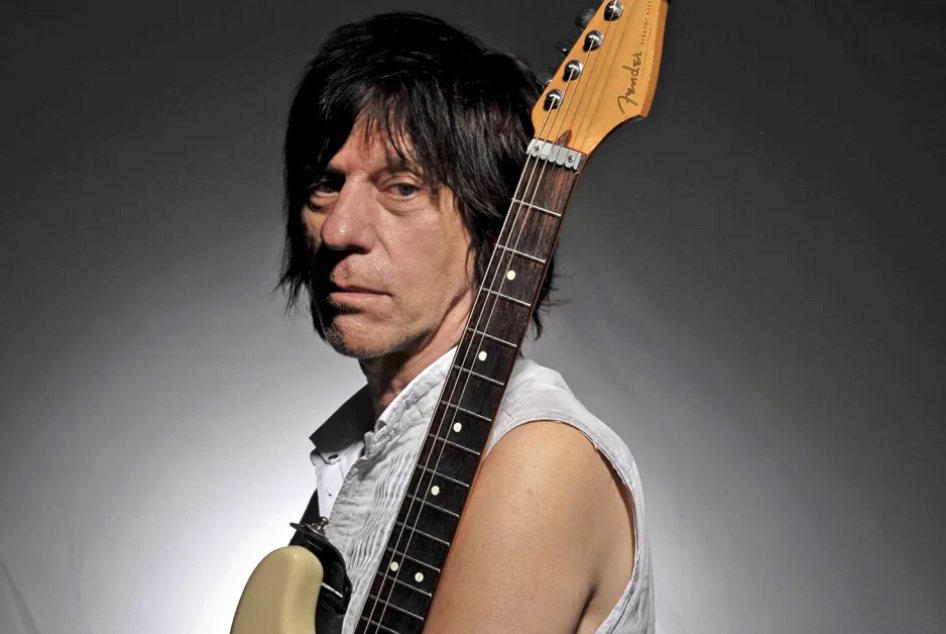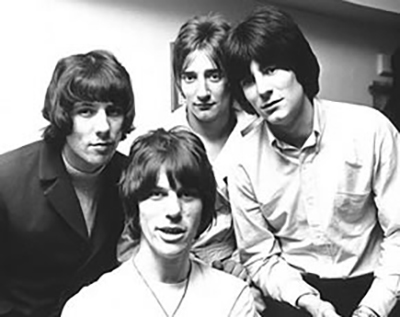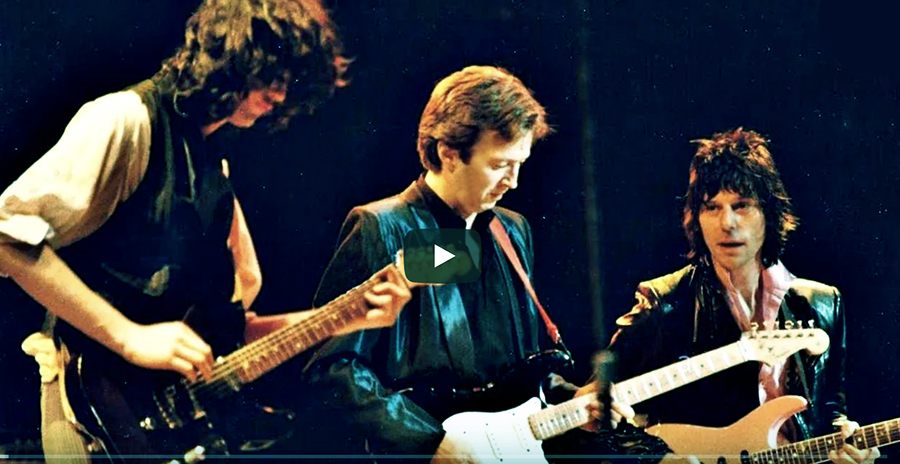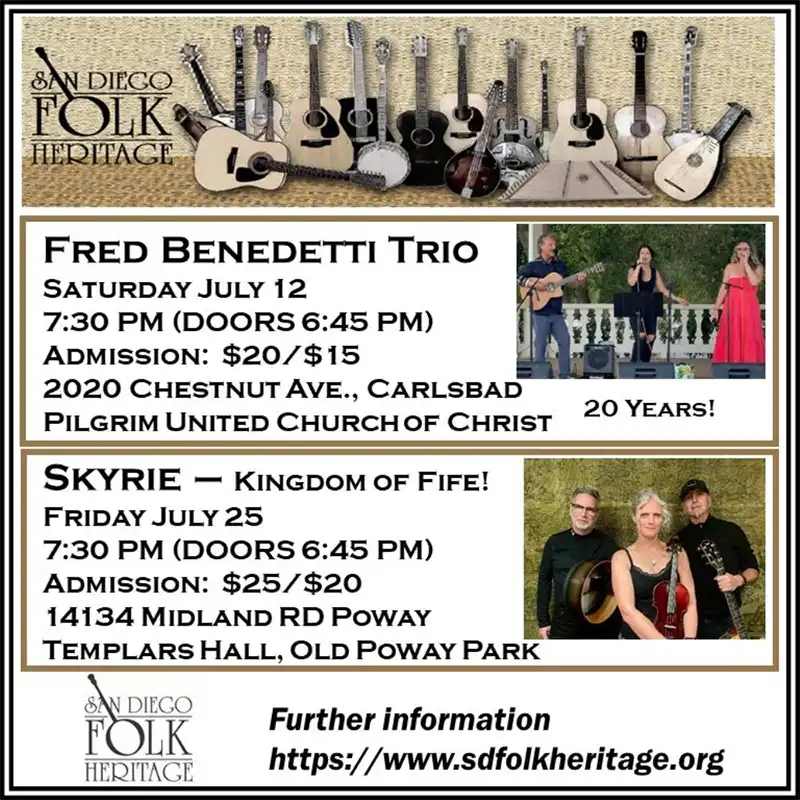Featured Stories
Jeff Beck: A Tribute

Jeff Beck. Photo by Joby Sessions.
In 1965 Eric Clapton opted to leave a plum gig as lead guitarist for the hit-making Yardbirds to join John Mayall’s Blues Breakers. The musician was tired of the pop-rock slant of the Yardbirds and also tired of the relentless touring that the position required. A gig with Mayall would allow him a chance to establish himself. So began a legend, but not the legend you might assume. After offering the band’s the guitar spot to Jimmy Page, who turned it down, Clapton recommended Jeff Beck to become the Yardbirds’ lead musician. The legend I mean is the rapid ascendancy of Beck. After gaining success with the band and becoming a bit of a minor celebrity among British guitar obsessives, Beck left the Yardbirds after a brief stint, in 1966. Recruiting unknown vocalist Rod Stewart, drummer Micky Waller, and Ronnie Wood on bass, he formed the Jeff Beck Group and released his debut album Truth in 1968.

The Yardbirds, ca. 1967: Beck, Jim McCarty, Chris Dreja, Jimmy Page, Keith Relf.
In a fevered scheme of perfect order, Jeff Beck ascended to the top of the rock-guitar pantheon and remained there for the rest of his playing life. Truth encompassed the essentials of raw blues styles that were key ingredients of what Hendrix and Cream were doing; Beck turned up the volume, gave the feedback a more blistering edge, and framed his improvisations with brio and verve that remains unmatched. The guitar’s fretwork was sparks, fireworks, sirens, a loud swamp rumble on the low end of the neck, and transcendental banshee wails in the higher registers. The first album was, I think, one of the most influential (if not the most influential) pioneering rock guitar records of all time. It and his worthy follow-up release, Beck-Ola, remain relevant because Beck refused to become irrelevant. While fellow Yardbird alumni Jimmy Page and Clapton had their productive runs and each became, to different degrees, retired elders living off fading charisma and recycling their old licks, Beck famously pushed ahead, forging new styles of fusion, jazz, reggae, and the many varieties of funk and electric mojo, confounding and amazing audiences for over six decades with an output that revealed a musician of ideas. Beck remained curious in new elements of music-making and new ways of making bracing, unprecedented sounds from his strings, pick-ups, and amps. He was the guitar god I was seeking. But even the gods give in to the wear of aging.

The Jeff Beck Group: Aynsley Dunbar, Jeff Beck, Rod Steward, Ronnie Wood.
News of guitarist Jeff Beck’s death comes hard. It certainly breaks my heart, as I imagine it does for anyone who followed Beck in his many incarnations since the 1960s. At 78 years of age, he succumbed to bacterial meningitis. I had the very cool pleasure of seeing him three times in my 70 years of breathing, including his last San Diego concert a few years back. Since the glittery vibe of the ’60s and all cultural eruptions until now, Beck’s guitar work—a shotgun marriage of approaches from Chicago blues, rockabilly, proto-hard rock, and jazz-fusion—was permanently embedded in my life’s soundtrack. Beck is a pioneer in matters of extending the vocabulary of an African-American vernacular and incorporating elements of funk, jazz, reggae, fusion and rockabilly into his particular mix. He recorded quite a bit of music that still makes me turn my head and stare incredulously at the speakers; when he wasn’t being cheap with his playing and willing to lavish more in guitar bravado, his guitar work is of a whole piece. Not just flashy solos, which were, in fact, the least of Beck’s best art, but control of tone color, splendidly tasty fills in the interstices of his band’s alternately rocking or fun. Jeff Beck is a great guitarist because, while his compatriots were concentrating on the number of notes they could cram into a 12-bar or 16-bar phrase, he did what makes him great.
Beck filled his solo slots with the gift of space—fewer notes, high-register bends, and unusual tunings—while others dominated their songs and performances with fusillades that eventually became a comfortable rut. I put forth his first two albums, The Jeff Beck Group and Beck Ola, in evidence and skip ahead to his fusion release, Wired, and still later Beck’s Guitar Shop as prime examples. That sweet, discerning blend of flash, taste, discretionary speed, off-center attack, and an uncanny mastery of electric guitar volume are marvels for future generations to listen to if they wonder what all the fuss was about. These weren’t records by an artist still making his reputation. Currently, his reputation was made, his name now a brand, his work too frequently a stylized snore. Again, I wish Beck would indulge the less savory side of his musical nature and burn a hole in the state no one can leap over. That, though, is part of the fun of treating musicians and their work. All the rapid, distorted, flashier bits are missing in large measure in the interest of a more mature purity, because Beck had refined his style to the point that he was drastically essentialist in tweaking his playing.

Jimmy Page, Eric Clapton, Beck.
Beck was always the most audacious of the Yardbirds triad, and he was easily the most unique of his generation. Only Hendrix rivaled him for advancing rock guitar, and it’s been our fortune that Beck stayed alive to add to his legacy. Even on most of the material, his improvisations were masterclasses in creating the unusual bend, the eccentric hammer on, the inexplicable quick and slicking note clusters that left you gasping in wonder. Beck fused his blunt and bruising blues essentials with styles that struck his fancy; he reinvented his style and manner of playing several times in as many decades, no less than Miles Davis. As with Davis, Beck didn’t hesitate to try something new and push the perceived limits of his technique. His musical fluency, his experiments, his routine switching gears, moods, grooves revealed a musician who liked to surprise himself with playing what he hadn’t played before. He was riveting like no other guitarist could be. The band from the albums Truth and Beckola rocked hard with a loose but fierce rhythm-section, and Beck’s guitar work seared like nothing else that had come before.
The 2018 concert at the Mattress Firm Amphitheater was a revelation. I’d had the honor of seeing Beck three times previously. Fluid, fast, angular, bluesy, full of blues phrasing framed sidewise, and in reverse order, tonalities from a refined adaptation of Indian classical improvisation, splintered chromaticism, power chords, fusion dynamics, and the sweetest lyric playing one would wish for. And, yes, lots of funk. All of this, of course, with a fine band, including drummer Vinnie Colaiuta (Frank Zappa, Sting, Herbie Hancock), vocalist Jimmy Hall, and bassist Rhonda Smith. Beck spent the majority of his career in a state of perpetual flux. He broadened his understanding of where a solo could go as the decades passed and his technique seemed all of absolute spirit, an undulating electric shimmer without seams, without stitches. Honestly, there was a period before this performance when I was in a depression that wouldn’t lift, and I had taken to lashing out at length at long-time heroes and icons, the usual accusation being that they were “overrated.” I’d written as much on a blog post, when I decided to trash Beck’s reputation, insisting that he was relying on old chops, that old age had slowed down the fingers. The concert was a revelation, though, even with a set list that highlighted a six-decade career; Beck’s singular genius was evident, very obvious. If I closed my eyes, I could imagine that this night was sometime back in 1968-69, and a younger Beck was lighting up the sky with fireworks of his own. It was a stunning rebuff to the gratuitous trouncing I gave the guitarist two years prior. After this show, I felt I owed the musician an amends for all the bad faith grousing about his work. His excellence never ceased, his innovation never ceased, and his playing remained the standard that generations of players are still reaching for.
I hope his tribute can be that amends.





